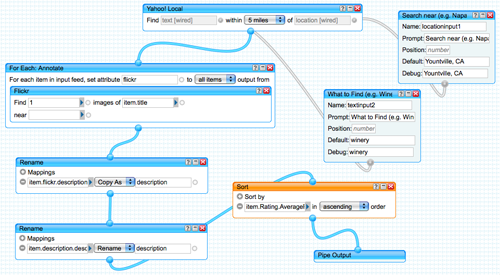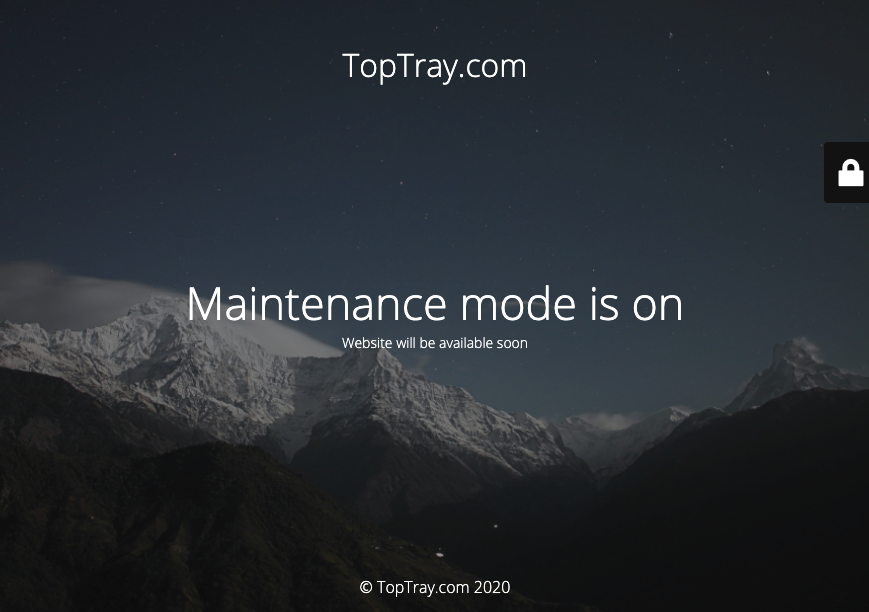3/18/24 – Update
Well, the time has come. My half-hearted attempt to revive TopTray has come to an end. I have a feeling that this time the shutdown of the TopTray is complete and permanent. I’ve deleted the posts, destroyed the legacy email newsletter subscriber list, and am leaving this page in place.
A heartfelt Thank You to all who have ever visited the site in the last 24 years.
fin.
6/25/2021
So yeah, welcome to TopTray.com. What is it? Good question. I’ve owned this domain for over 20 years and I still can’t answer that question. I always thought it was kind of a catchy name, harking back to the days when you had filing trays on your desk. Usually, the top tray was your physical inbox. Things in the physical inbox were new things to look or new work. Thus TopTray.com = new things = my code playground.
Mostly it has been a canvas for trying new things, proof-of-concepting for ideas and such. In the beginning it was kind of an experiment for anonymous-but-public messaging. Like a forum, but more like a stream of consciousness. In retrospect, I like to joke that I invented Twitter before Twitter did. But it was always just a front for me learning some relational database skills and Visual Basic.
The Hyper Local Blog Aggregator
When the golden age of blogging came around, I used it to fetch some local bloggers’ RSS feeds to create a hyper-local content aggregator. I started with Lilina (RIP) but you can find a forked version at Lylina these days.
It worked okay, but taxing on the server – especially when I got to the point of scouring about 150 local feeds. I ended up playing with different options of refreshing the feeds, but never quite got it the way I wanted. It would always time out a couple of times an hour depending on traffic to the site and parsing the feeds.
Enter Yahoo Pipes
Yahoo Pipes (RIP) was kind of the shit was absolutely the shit at the time.

With Pipes, I was able to create a workflow of parsing all the feeds and then just republishing a combined feed. It updated every 30 minutes behind the scenes.
Site traffic grew and this site was pulling in a few thousand pageviews a day and never monetized. And in 2008 I spun up a second version pulling in bloggers from the Portland area when a friend of mine moved out that way. I know that I was either going need to roll my own RSS feed parser to the keep the data fresh in different source and write the output for page load. But server space was still fairly expensive at the time and cloud servers were still a little ways off for a solo dev.
Things were awesome, except I eventually ran into use limits for hitting sites build on Blogger.
And by 2010 I started to see a lot of the blogs we were indexing start to die off. It seems like every couple of days I was pruning sources from the list, followed by multi-day droughts of no new content.
I pulled the plug in late 2010.
Sadly, Yahoo Pipes was shut down in 2015. I was still using it for other computational projects until then. I did move on to import.io for a bit. Nowadays, most of my automations are done with Zapier, IFTTT and my new favorite: Apple Shortcuts.
Apple Shortcuts
Seriously, go learn about Shortcuts. This person automated most of the admin details for their wedding photography business, and it really opened my eyes to the kind of things that can be done with Shortcuts. I don’t know how many times I’ve shared that link with people, but I still keep coming back to it.
I can’t tell you how happy I am to have Shortcuts coming to macOS this fall!
Enter Social Media Marketing
As web developer/marketer by day – and not getting the chance to really flex the power of social with my clients – I turned TopTray into a social media marketing side gig.

TopTray Social Media Marketing
I took on a few clients here and there, but stopped actively pursuing the work when most of my clients at my day job started jumping on board over the next couple of years.
The site just sat there for a few years. I had a few dozen articles published, and occasionally took the time to push out new content.
The plug on this chapter was pulled in 2015.
Nothingness
From 2016 to 2019, there was nothing but a blank page.
I still had my Twitter account connected to the site and started to use Twitter as my own personal link blog. In 2017, I had reinstalled WordPress and was doing a lot of Twitter analytics. Mainly, my own personal deep dive into Twitter botnets and the usage of disinformation. I had the Maintenance Mode plugin running so all anyone ever saw was the Maintenance screen.

Even though that is all that was there, the site was still getting 20-30 pageviews a day. Thanks to massive amount of backlinks the blog aggregator version of the site built up.
I kind of liked using WordPress as an online mindmap application, and so all my notes, research, musings and code were all there in one place. I’ve since moved my research from the blog to Apple Notes just because that really reproduces what I was doing, but better.
A couple friends of mine suggested using my research to build a site that would identify if a Twitter account was run by a human or a bot. But the guys over at BotSentinel do a much better job that I ever would have been able to do.
What Happened Today?
I was doing some server maintenance and running WordPress related updates.
I started to reminisce about the history of this site and what I’ve learned from in the past and decided to jot down a quick note. That turned into this wall of text.
Also, Reddit was down for a bit this afternoon 🙂